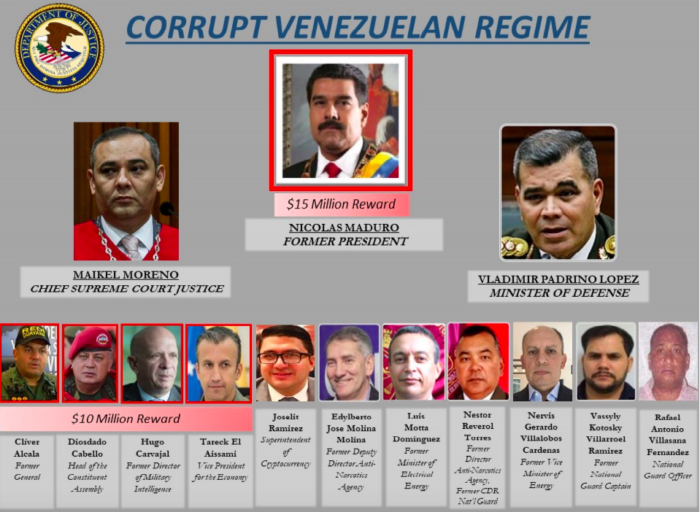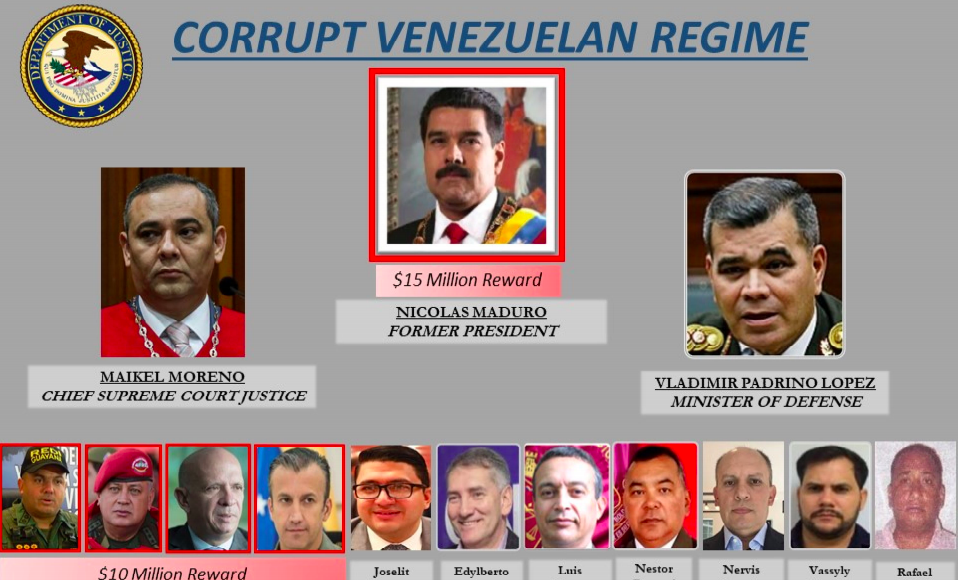LAB received this article from Venezuelan National Science Prize winner Victor Álvarez. It is a follow-up to his earlier appeal for a coalition government to involve both Maduro and Guaidó.
Translated for LAB by Jasmine Haniff.
Placing a price on the heads of Maduro and his main collaborators to force them into negotiating the departure from power is not a credible threat for a coalition that is hard to scare. Actually, it has a counterproductive effect: the more they are threatened and the fewer guarantees they are given, the more they will stick together to hold onto power.
The Department of Justice has brought criminal charges against Maduro and his officials and offered a reward of up to US$15 million for any information that will lead to their arrest or prosecution. Instead of creating mistrust within the governing coalition, the US is now accusing them all equally, which is counterproductive for their strategy of promoting division. Any incentive that the accused officials might have had to force Maduro to resign has now disappeared. On being indicted, they will close ranks to gain power and save their own skins.
Preventing direct negotiation between the ruling party and the opposition
Brought together by the threat of coronavirus, negotiations between Maduro and Guaidó to manage humanitarian aid, the exchange of oil for food and medicine, as well as financial aid from the the IMF under the administration of international organisations such as the UNDP, the WHO and the IRC, was gaining traction in national public opinion. The common agenda of the government and the opposition led them to combine their abilities and resources to fight the threat of the coronavirus together and prevent it from rapidly spreading far and wide across the national territory.
The indictment of Maduro and his collaborators, as well the multi-million dollar reward on their heads, however, destroys the possibility of an autonomous political agreement between the government and the opposition without the supervision of other external powers for whom Venezuela is no more than another piece on their geopolitical chess board.

This move cannot be interpreted as a step towards a politically negotiation solution to the Venezuelan crisis. The indictment makes Maduro and his associate wanted criminals who, in the eyes of the US authorities, cannot be negotiated with. Members of the opposition, who have received unequivocal support from the White House, will not want to be seen as complicit with internationally wanted criminals.
Such accusations have consequently cut short the process of negotiation that had reopened between the government and the opposition, a process which had already appointed a Nomination Committee to elect the new National Electoral Council.
‘Democratic Framework’ or White House ultimatum?
A few days after the ‘bad cop’ US Attorney General’s Office indicted Maduro and his collaborators, putting a juicy bounty on their heads, the ‘good cop’ State Department announced a Democratic Transition Framework for Venezuela.
The White House’s latest strategy proposes that both Maduro and Guaidó step aside and surrender power to a Council of State made up of five members which would govern the country until it is able to hold presidential and parliamentary elections in 6 – 12 months’ time. Guaidó gave this plan his stamp of approval but Maduro refused to go through with a plan that would not allow for his participation.
While it is true that the State Department’s plan includes proposals made by a number of different sectors in favour of a political and electoral solution to the Venezuelan crisis, the first problem with the Democratic Transition Framework is that it was not exactly the outcome of a process of dialogue, negotiation and democratic agreement between the internal members of the conflict. Rather, it was a prefabricated plan made by the State Department and announced unilaterally as an instruction manual for the parties to follow.
Another problem with the State Department’s proposal is that it envisages holding elections within 6 – 12 months. How does it propose to hold elections in such a short space of time? With the coronavirus pandemic barely having hit Venezuela as yet, surely the massive concentrations of people, typical of any electoral campaign, would go against the social isolation measures that must be complied with to avoid a massive and accelerated spread of the disease.
The third problem with the White House’s plan for Venezuela is that, to appoint members of the Council of State, each party or coalition that comprises 25 per cent or more of the National Assembly must select one member. The fifth member – who would serve as an interim president until the elections are held – would be appointed by the other members of the Council. Since the National Assembly is divided, with two administrations, one chaired by Juan Guaidó and the other by the dissident opposition parliamentarian, Luis Parra, who has the support of Maduro’s party, this procedure would require prior political agreements.
If we leave to one side the extreme options of a military or ‘surgical’ intervention, and focus on the more suitable option of finding a peaceful political and electoral solution to the Venezuelan crisis, it is not feasible to draw up any plan without the participation and approval of Nicolás Maduro’s government – a government which, in addition to controlling public administration, has the support of the National Armed Forces, 19 out of 23 provincial governors, almost 300 of 335 mayor’s offices, and holds real power over the national territory.
Indicted and with a large reward looming over their heads, Maduro and his associates will not step down from power. Such a withdrawal from power can only be considered and debated if Maduro is assured of the protection of his political rights and if the United States acquit him of the charges that he is part of a narco-terrorist conspiracy. As long as the Maduro government feels exposed to the US justice system, no ‘Democratic Transition Framework’ is going to work. This leaves Venezuela open to military intervention, which appears to be more likely e once more after the recent deployment of US Air and Naval Armed Forces.
Main image from US Justice Department

